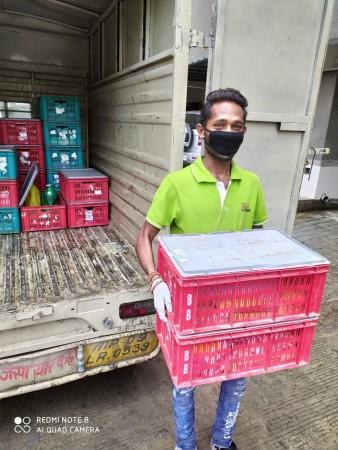The coronavirus lockdown has led to the disruption of supplies to impact the delivery of essentials, by e-commerce vendors such as BigBasket and the likes. To help residents of Bengaluru, Noida, Hyderabad, and Chandigarh get access to their daily necessities and essentials, BigBasket has entered into a B2B partnership with Uber to facilitate last-mile delivery. More cities will be added in time, says the e-commerce grocery vendor.

Prabhjeet Singh, Director-Operations and Head of Cities, Uber India & South Asia, Uber India said, "The company is looking at similar partnerships with other e-commerce players and supermarkets to help with last-mile delivery."
Further Uber will not be charging any commissions for these trips. "The commission shared with the partners will be passed on fully to the driver-partner, helping them to have additional earnings during these hard times," Singh added.
What does the BigBasket-Uber B2B partnership entail?
According to the partnership, the e-commerce player or supermarket will be able to book vehicles across Uber categories to include UberGo (hatchback), UberMoto (two-wheelers) and UberXL (SUV) for the entire day to deliver essentials ordered by customers.
The goods will be delivered by Uber drivers in compliance with the traffic regulations and hygiene standards as specified by the Government. The driver-partners will be provided with necessary PPEs to include sanitisers, masks, gloves, and specialized safety training to deliver the highest possible standards in hygiene and safety during product delivery.
"The ongoing pan-India lockdown has led to a disruption in the supply of essential goods, primarily led by a shortage of personnel and delivery vehicles. We are very happy to partner with Uber India for this initiative and we will be utilizing a portion of their huge fleet of cars, bikes as well as personnel to help with our deliveries to fulfill customer orders. We are thankful to Uber India for helping us deliver essential goods to thousands of customers across the country and the opportunity to provide financial sustenance to many drivers and riders during this time. As a brand, we are committed to providing the best possible services to our customers and this partnership with Uber is another step towards that goal," said Lalita Aggarwal, National Process Head-Last Mile, BigBasket.
The e-commerce grocery vendor will partner with the local administration to procure necessary permits and passes to ensure goods are delivered to customers without any hassles to driver-partners either. Meanwhile, Domino's and ITC have entered into a similar kind of partnership to deliver groceries via the Domino's app in Noida, Chennai, Kolkata, Mumbai, and Hyderabad.
As the situation gets grimmer with an increase in coronavirus cases across India, the nationwide lockdown measures are becoming sterner by the day, the industry eagerly awaits many such partnerships in the days to ease daily necessities procurement woes of customers across the nation.
Online ordering sees a spike: BigBasket, Grofers, Medlife on a hiring spree
As online ordering of groceries, medicines and other daily essentials witness a spike post nationwide lockdown imposed, the online delivery platforms BigBasket, Grofers and MedLife are reaching out to job portals to hire idle restaurant staffers as riders and pickers on a temporary contract to deliver essentials to customers.

With a need for 800 riders, the businesses are willing to offer them Rs 50 per delivery, and approximately 500 pickers are required at salaries starting from Rs 16,800 per month. On selection of the riders and pickers, companies will arrange for the necessary passes and permits to operationalise their workings.
BigBasket has partnered with the Retail Association of India and NRAI to offer jobs to staff laid off owing to coronavirus lockdown. Meanwhile, e-commerce MNCs such as Amazon, Flipkart, and Dunzo are struggling with the need for on-ground staffers, as many migrant workers fled back to their hometowns considering the ongoing lockdown and lack of work, and some others are unable to show up at work owing to transport scarcity and police harassment.

















